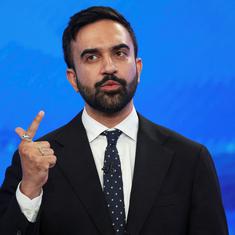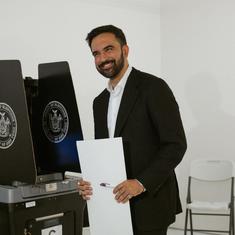Mangesh Hadawale is best known for directing the acclaimed Marathi film Tingya (2008), in which the rural farming crisis affects a boy’s relationship with his pet bull. In the Hindi-language Malaal, Hadawale turns his attention to another kind of distress – that of the human heart.
Love is evolving in slow motion in a chawl in Mumbai in the late 1990s. Brawny layabout Shiva (Meezaan Jaffrey) has fallen for Astha (Sharmin Segal), his new neighbour. Astha’s father has been forced to downgrade after losing his money in the stock market, and Astha’s more polished ways initially keep Shiva at bay. Astha is from Uttar Pradesh, and Shiva is trying to prove his nativist credentials to the leader of a party modelled on Shiv Sena, so there is that too.
When did love ever heed boundaries? Shiva decides that Astha is the one, and she seems to be sending him encouraging looks from beneath her perfectly sculpted eyebrows. If Shiva’s love is boundless, Astha’s is unconditional. She is the prim school teacher to Shiva’s unruly back-bencher. Stop brawling, smoking and drinking (in that order), get a job, open a bank account, and we shall watch the sun ascend over the Mumbai high-rises together, Astha tells Shiva.
When did love ever proceed as its practitioners intended? The main villain, if it can called that, is Astha’s family, which would much rather that she married a man above her station. Shiva’s affiliation with the nativist political party, which could be a possible obstacle to his romance, is forgotten soon after it is mentioned. The Marathi-versus Hindi debate is also set aside as the movie settles into charting the love between Shiva and Astha, which goes mostly nowhere and, finally, at the end of 136 minutes, somewhere.
Malaal is a launchpad for two next-generation actors, and only one of them leaves a trace. Meezaan Jaffrey turns out a sincere and likable performance, but Sharmin Segal is unable to match her facial expressions with the emotions Astha is supposedly feeling. Segal is the niece of producer Sanjay Leela Bhansali, but it’s Jaffrey, the grandson and son of actors Jagdeep and Javed Jafferi, respectively, who ends up getting the long end of the stick.
There’s nothing terribly wrong with the movie, a official remake of Tamil director Selvaraghavan’s 2004 hit 7G Rainbow Colony, but there is also little imaginative. The Hindi version retains only the broad plot details of 7G Rainbow Colony (Selvaraghavan has been given story credit, and the Hindi screenplay is by Hadawale and Bhansali.) Malaal plays out like a desiccated version of 7G Rainbow Colony, which isn’t always a bad thing.
The misogyny that was passed off as true love has made way for something resembling an even-handed courtship. The toxic juice that flowed through the veins of the original film’s hero has been squeezed out of his Hindi heir. His stalker-like moves (which included two notorious scenes of him rubbing up against his love interest in a public bus) have been replaced by an old-fashioned courtship. Astha fits the goody-two-shoes heroine stereotype that filmmakers love so dearly, and Shiva’s open-shirted swagger is also all too familiar, but at least they don’t want to make you reach for your copy of The Second Sex.
A film about amour fou from a male point of view has been remade, but into what, exactly? Malaal is missing a core. The movie has nothing new to say about the star-crossed romance, and is too timid to mirror the unabashed celebration of unreconstructed malehood that marked the source material. As Shiva and Astha endlessly exchange looks and more, their relationship appears increasingly inchoate and anodyne. The frisson is missing, and the pathos suggested by the title never makes its promised appearance.










